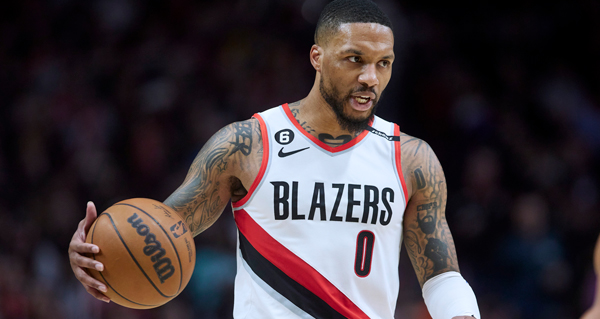For several years, Damian Lillard has told a story about himself. In this story, he is a small-market loyalty warrior; the last true gun-slinging, ruggedly individualistic cowboy in a bloodless modern world of globalist business mergers otherwise known as “superteams.” Only he, his collection of symbolic gestures suggested, would eschew the heartless new way of things, and stick to the grind that the working man understands. His ability to sell this slice of iconography has had nearly as much to do with his great success as his basketball skill has. Rarely has a player with such humble overall postseason accomplishments reached Lillard’s level of stardom; he has enjoyed life in a nearly universal stratosphere of deep respect with fellow players, media members, and the corporations that hand out lucrative player endorsements.
Over the weekend, Damian Lillard gave this glowing lone wolf reputation its first formal stress test. He requested a trade from the Portland Trail Blazers to the Miami Heat, who have been the Eastern Conference’s best playoff performer for the past four seasons, and appear one Lillard-sized contribution away from a title. It’s the end of a lengthy era; Lillard’s stay in Portland is eclipsed, in the current NBA, by only Steph Curry’s with the Golden State Warriors. The dissolution of such a long bond was always going to be ugly, but Lillard’s long commitment to a sanctimonious bit—which had already grown tenuous over the past two years, as smoke about his eagerness to leave the sinking Blazers for a title contender has risen—will make this one uglier.
It hasn’t happened yet, though. Since Lillard’s desire to go exclusively to Miami is so obvious, the Blazers are low on the kind of deal-making leverage a franchise typically looks for when they’re trading away someone who’s been a centerpiece for a decade-plus. The Heat’s offer for Lillard leaves a lot to be desired: Tyler Herro, Duncan Robinson, and draft compensation are hardly a starter’s kit for another perennial playoff team. If the return is to get any better for Portland, they will need to start some grimy negotiation wars, necessarily clashing with their fanbase’s hero. The Blazers faithful are less than a week into what looks to be a protracted battle between the best prospects for their team and the optimal personal outcome for the player who’s made them worth watching for a while.
Amidst this burbling controversy are numerous hyperbolic talking points about Lillard’s value and legacy. A 33-year-old who has been a negative defender and underwhelming playmaker his entire career, he is often cited as “the greatest Blazer of all time.” No rubric that is even remotely objective would take you to this conclusion, if only because Bill Walton was an MVP who won a title for the team in 1977. He was elite on both ends, as was Clyde Drexler, who took the team to the NBA Finals in both 1990 and 1992. Lillard’s feats, including two indelible series-winning shots and eight playoff berths in eleven years, are substantial. But to claim they top Walton’s and Drexler’s is to get hysterically lost in a contemporary sauce, and refuse history.
The cult of individualism is a virus that plagues every aspect of American life, so we should not expect sports fandom to be, in any way, immune. Many Los Angeles Lakers fans developed such an over-cooked appreciation for Kobe Bryant that, after his retirement, and LeBron James’ arrival to the team, there are followers who have denied James’ greatness because of how acknowledging it might, in some indirect fashion, diminish the light in which Bryant’s accomplishments are held. And while Bryant’s career with the Lakers was an indisputably great one, it’s not as if the team was lost in the woods before he got there; they were 11-time champions, and had featured at least three of the ten best players of all time in Magic Johnson, Kareem Abdul-Jabbar, and Wilt Chamberlain. Bryant’s bright time as the star of the show, however, means more than all this to some—likely because his brilliance overlapped with their growing up, and maturing as basketball fans.
Most people never recapture the love of music they had during their high school or college years, when their brains were so underdeveloped that they believed themselves to be singularly immersed cultural plunderers. Basketball fandom is like this too, and so we have all around us a lot of Damian Lillard believers who are, like the Kobephiles before them, uninterested in the bigger picture. Lillard hit into their hearts when they were raw, ready to believe in anything that was cool to look at, and loud enough to make the national basketball apparatus take momentary note. He reinforced it with his regionally appealing mythos, but that tale has now expired. Many find it too attractive to let go of just yet, or ever. They may choose to believe in it for eternity, and splinter off from the larger Blazers project in order to kneel instead at the statue of Dame’s sainthood. For everyone else, though, that story is over, and the challenge of Lillard’s next act lies in trying to tell a new one.



